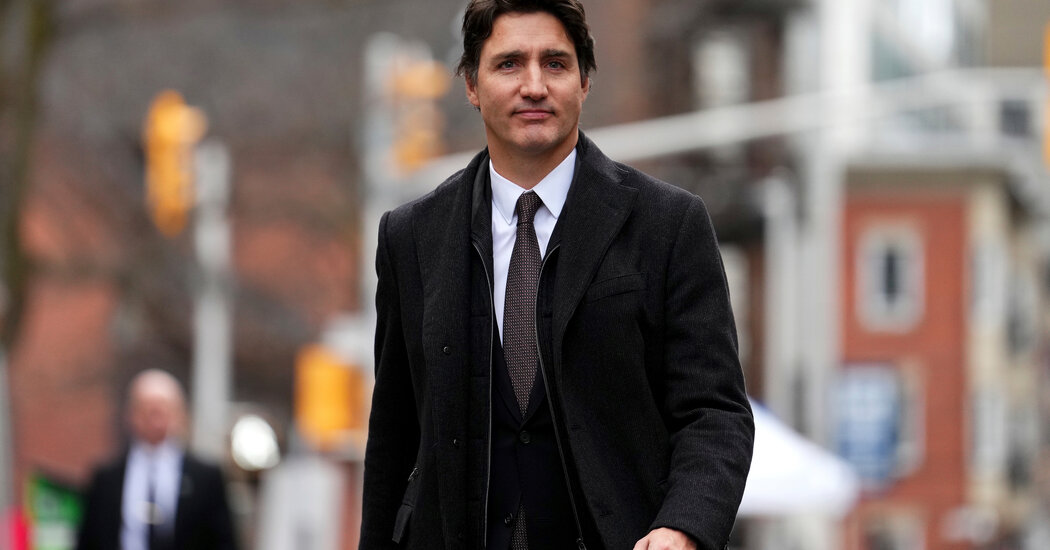Prime Minister Justin Trudeau of Canada has long dismissed allegations that China interfered in his country’s past two general elections. Not a single electoral district was affected in 2021, he said last week, even though evidence of China’s meddling has kept growing in an ongoing foreign interference inquiry.
Mr. Trudeau is expected to testify in Ottawa on Wednesday at a public hearing of the inquiry, which he was pressured to call after an extraordinary series of leaks last year to Canadian news outlets of intelligence reports on Chinese interference.
At the hearing, Mr. Trudeau is likely to face sharp accusations that he did not take the threat of foreign interference seriously enough because his Liberal Party is believed to have benefited from China’s actions in the general elections of 2021 and 2019.
Mr. Trudeau’s much-anticipated testimony is expected to cap this round of public hearings, which over the past three weeks have featured his closest aides, intelligence officials and political party leaders, as well as politicians believed to have been the target or the beneficiary of Chinese state interference.
Intelligence officials have long warned about the threat of foreign interference to Canadian democracy.
But the public hearings — through the release of intelligence reports and the sworn testimonies of witnesses — have painted a fuller picture of how rising foreign powers like China and India have tried to advance their interests by increasingly tapping into diaspora communities and exploiting Canada’s democratic institutions.
Though the inquiry has not singled out any one country, most of the hearings have focused on China, which, according to one intelligence report, “is — by far — the most active” in meddling in Canada.
China’s “activities are sophisticated, pervasive, persistent and directed against all levels of government and civil society across the country,” the report said.
China’s efforts in Canada — as well as in other countries — have increased since President Xi Jinping came to power in 2013, experts say. The Chinese government has interfered in foreign elections by gaining influence over community organizations, influential figures and Chinese-language news media — and by extending its reach over its diasporas worldwide, experts say.
“These foreign interference efforts are becoming increasingly embedded in community-based networks that link federal, provincial and municipal politics in key Canadian cities,” another intelligence report said about China’s activities, adding that these “networks are potential tools of leverage against Canadian political officials.’’
The Chinese Embassy in Canada has denied any interference in Canadian politics.
After Mr. Trudeau was first elected in 2015, he pushed for a free-trade agreement with China as part of an overall policy to build friendly ties with Beijing, and initially dismissed security warnings, including about allowing Huawei Technologies, the Chinese telecommunications company, to work in Canada’s wireless networks.
But relations turned hostile when Canada arrested Huawei’s chief financial officer on a United States extradition request, leading Beijing to detain two Canadians in China in retaliation. In 2022, Mr. Trudeau’s government formally shifted its policy toward China, calling it “an increasingly disruptive global power.”
Still, the main opposition Conservative Party has taken a harder stance against China, pushing legislation condemning China on its human rights record and criticizing its security crackdown in Hong Kong.
In the 2021 Canadian election, a media campaign, with suspected links to the Chinese government, was “aimed at discouraging Canadians from supporting the Conservative Party,” according to an intelligence report made public during the hearings.
Erin O’Toole, the leader of the Conservatives in 2021, testified at the inquiry last week that he believed that his party had lost five to nine districts in that year’s election because of foreign interference — though not enough to change the overall outcome of the race.
In response, Mr. Trudeau told reporters, “I can understand where someone who lost an election is trying to look for reasons other than themselves why they might have lost an election.”
The Conservatives won the popular vote in 2021. But the Liberal Party gained the most seats, and Mr. Trudeau returned to power with a minority government.
The inquiry commission, which is led by Marie-Josée Hogue, a Court of Appeal justice from Quebec, is required to issue a preliminary report in May. The commission is expected to issue a final report on how to tackle foreign interference after holding another round of public hearings next fall.


